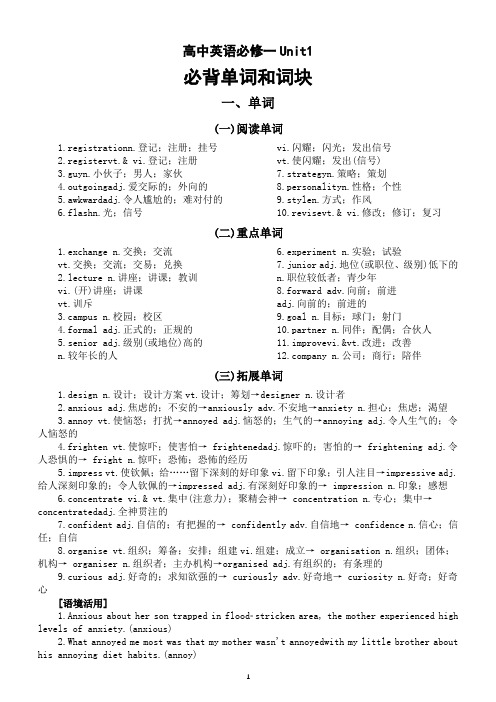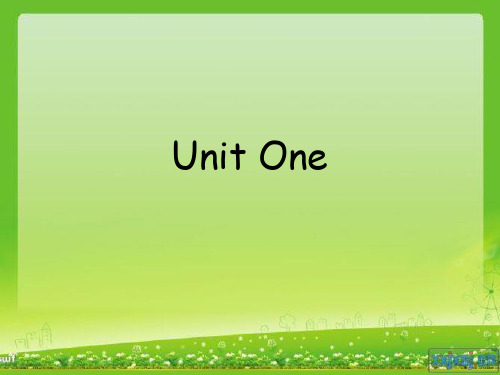unit 1 language notes
- 格式:ppt
- 大小:3.27 MB
- 文档页数:47


人教版九年级英语unit 1 notes人教版九年级英语unit1 笔记一、重点短语1. by listening to tapes 通过听录音带2. by working with a group 通过小组学习3. by watching English movies 通过看英语电影4. by asking the teacher for help 通过向老师寻求帮助5. by reading aloud 通过大声朗读6. by speaking English as much as possible 通过尽可能多地说英语7. by making flashcards 通过制作抽认卡8. by practicing conversations with friends 通过和朋友练习对话9. by taking notes 通过做笔记10. by writing e-mails to pen pals 通过给笔友写电子邮件二、重点句型1. How do you study for a test? 你如何为考试而学习?2. I study by working with a group. 我通过小组学习。
3. It’s too hard to understand the voices. 声音太难听懂了。
4. What about reading aloud to practice pronunciation? 大声朗读来练习发音怎么样?5. I have a lot of trouble memorizing new words. 我在记新单词方面有很多困难。
6. I find it easy to learn English. 我发现学习英语很容易。
三、词语辨析1. too...to... 太……而不能……,表否定so...that... 如此……以至于……,表肯定例:He is too young to go to school. 他太小了以至于不能去上学。



七年级上册第一单元英语笔记Unit 1: English Notes for Grade 7 (First Semester)Hello everyone! Today, I will be sharing my English notes from the first unit of the seventh-grade syllabus. In this unit, we have covered various topics that are essential for building a strong foundation in the English language. Let's dive into the key points and concepts we've learned!1. Greetings and IntroductionsWe began the unit by learning the basic greetings and introductions. This includes phrases such as "Hello," "Hi," "How are you?" and "Nice to meet you." It is important to use these phrases appropriately in different situations to make a good impression.2. Personal InformationNext, we focused on learning how to express personal information. We learned to introduce ourselves by providing our names, ages, nationalities, and other details. It is crucial to practice these conversations regularly to gain confidence in speaking English fluently.3. Classroom LanguageIn this section, we learned common classroom language to enhance our communication within the school environment. Phrases like "May I go to the restroom?" or "Can you repeat that, please?" were covered. It is essential to understand and use these expressions effectively to communicate with teachers and classmates.4. Numbers and Countable NounsWe dedicated a considerable amount of time to learning numbers and countable nouns. This involved understanding how to spell and pronounce numbers, along with basic mathematical operations. Additionally, we practiced using countable nouns in sentences, such as "I have three pens."5. Plurals and Indefinite ArticlesThis section introduced us to plurals and indefinite articles. We learned how to make nouns plural by adding "-s" or "-es" at the end. Moreover, we explored the usage of indefinite articles like "a" and "an" before singular nouns. These concepts are vital for constructing grammatically correct sentences.6. Subject Pronouns and Possessive AdjectivesUnderstanding subject pronouns and possessive adjectives is crucial when engaging in conversations. We covered pronouns such as "I," "you," "he," "she," "it," "we," and "they" in various conversational contexts. Possessive adjectives, such as "my," "your," "his," "her," "its," "our," and "their," were also discussed.7. Family and RelationshipsLearning to talk about family members and relationships allows us to have meaningful conversations. We studied vocabulary related to family members, including "mother," "father," "brother," "sister," and so on. We also explored conversational phrases such as "Who is this?" or "How many siblings do you have?"8. Daily RoutinesDescribing our daily routines helps us understand the concept of time and develop our language skills further. We practiced using appropriate verbs and adverbs to explain our daily activities, such as "I wake up at 7o'clock," "I brush my teeth," or "I go to school by bus."9. Hobbies and Leisure ActivitiesTo make conversations more engaging, we learned how to discuss our hobbies and leisure activities. This included vocabulary related to various hobbies, such as "reading," "playing sports," "drawing," and "listening to music." Sharing our interests and discussing them in English helps to expand our vocabulary and improve our speaking skills.10. Describing People and ThingsIn this section, we learned how to describe people's physical appearance and objects in detail. We practiced using adjectives effectively to express characteristics such as height, weight, and color. For example, we learned to say, "She has long brown hair," or "The car is red and fast."In conclusion, these are the key points and concepts covered in the first unit of the seventh-grade English syllabus. By familiarizing ourselves with basic greetings, personal information, classroom language, numbers, plurals, pronouns, and more, we have taken an important step towards building a solid foundation in English. Practicing these concepts regularly will undoubtedly lead to significant improvements in our language skills. Let's continue to explore, learn, and grow in the world of English!。

初中英语冀教版八年级上册Unit1《Lesson1 Back to School》优质课教案省级比赛获奖教案公开课教师面试试讲教案【名师授课教案】1教学目标1.进行课堂听说读写训练,提高学生英语听说读写能力。
2. 将课文主题与生活紧密联系,培养学生在生活中学习英语、运用英语的能力。
2学情分析通话学习,学生具备一定的交流及会话能力3重点难点4教学过程4.1第一学时教学活动1【导入】Back to schoolStep 1: Warm-up1. GreetingT: Good morning, girls and boys.2. Lead-inHow do you like the first day of a new school year?Do you have any new subjects? Do you think you will like them?Key Words: new subjectsStep 2: Listening and taking notes1. Listen to the dialogue.2. Listen again and tick the correct pictures.3. Listen to the teacher carefully and take notes when meet important points. Step 3: SpeakingT: Work in pairs. Role-play Li Ming and Danny, talk about your new term.Step 4: Sample Items and Tasks ListFour erasers (2 points)Three rulers (2 points)。



教案课程名称新生代英语基础教程1 课时班级专业教师系部教研室教材《新生代英语基础教程1》补充教学资源VOCABULARY BUILDERSHOW TIME➢语言解析1. She’s married to Mr. Smith. 她和史密斯先生结婚了。
be married to sb. 与某人结婚e.g. She has been married to her husband for 10 years.她和她丈夫结婚10年了。
2. I look forward to being your instructor this semester.我期待着这个学期成为你们的老师。
look forward to doing sth. 表示“期待做某事”,to 是介词,后面接动词的-ing形式。
e.g. I look forward to seeing you again.我盼望再次见到你。
The little girl is looking forward to visiting the zoo.小女孩盼望着去参观动物园。
3. Mateo, at your service. 玛特奥,很愿意为您效劳。
at your service 愿意为您效劳e.g. If you need any help, I'll be at your service.如果你需要帮助,我愿意为您效劳We are very glad to be at your service.我们很高兴为您效劳。
READING➢语言解析1. Last Monday, I was in a hurry. 上星期一,我很着急。
in a hurry 匆忙e.g. He put on his clothes in a hurry.他急急忙忙地穿上了衣服。
I'm in a hurry, so come to the point.我赶时间,直截了当说出来吧。




新目标英语八下unit1-5notes全文版Unit 1 What’s the matter?1.……26路公交车正行驶在中华路上,这时司机看到一位老人躺在路边。
…bus No.26 was going along Zhonghua Road when the driver saw an old man lying on the side of the road.2.我正要冲澡,就在这个时候电话响了起来。
I was just getting into the shower when the telephone rang.3.他们进去的时候,看到一些孩子正在花园里高兴地玩耍。
When they went in, they saw some children playing happily in the garden.4.我们看见他独自站在那里,不知做什么是好。
We saw him standing there alone, not knowing what to do.5.公交司机……没有多想便停下了车。
The bus driver… stopped the bus without thinking twice.6.在我们做出这个决定之前,必须认真思考!We must think twice before we make this decision!7.好好想想,也许你会改变主意的。
Think twice about it. Maybe you’ll change your mind.8.多亏了王先生和乘客们,医生及时挽救了老人的生命。
Thanks to Mr. Wang and the passengers, the doctors waved the man in time.9.如今多亏有了互联网,你在家里就能买到你所要买的东西了。
Today, thanks to the Internet, you can do all your shopping from home.10.因为你们的节目,我们方能相互认识。


高中英语必修一Unit1 必背单词和词块一、单词(一)阅读单词1.registrationn.登记;注册;挂号2.registervt.& vi.登记;注册3.guyn.小伙子;男人;家伙4.outgoingadj.爱交际的;外向的5.awkwardadj.令人尴尬的;难对付的6.flashn.光;信号vi.闪耀;闪光;发出信号vt.使闪耀;发出(信号)7.strategyn.策略;策划8.personalityn.性格;个性9.stylen.方式;作风10.revisevt.& vi.修改;修订;复习(二)重点单词1.exchange n.交换;交流vt.交换;交流;交易;兑换2.lecture n.讲座;讲课;教训vi.(开)讲座;讲课vt.训斥3.campus n.校园;校区4.formal adj.正式的;正规的5.senior adj.级别(或地位)高的n.较年长的人6.experiment n.实验;试验7.junior adj.地位(或职位、级别)低下的n.职位较低者;青少年8.forward adv.向前;前进adj.向前的;前进的9.goal n.目标;球门;射门10.partner n.同伴;配偶;合伙人11.improvevi.&vt.改进;改善pany n.公司;商行;陪伴(三)拓展单词1.design n.设计;设计方案vt.设计;筹划→designer n.设计者2.anxious adj.焦虑的;不安的→anxiously adv.不安地→anxiety n.担心;焦虑;渴望3.annoy vt.使恼怒;打扰→annoyed adj.恼怒的;生气的→annoying adj.令人生气的;令人恼怒的4.frighten vt.使惊吓;使害怕→ frightenedadj.惊吓的;害怕的→ frightening adj.令人恐惧的→ fright n.惊吓;恐怖;恐怖的经历5.impress vt.使钦佩;给……留下深刻的好印象vi.留下印象;引人注目→impressive adj.给人深刻印象的;令人钦佩的→impressed adj.有深刻好印象的→ impression n.印象;感想6.concentrate vi.& vt.集中(注意力);聚精会神→ concentration n.专心;集中→concentratedadj.全神贯注的7.confident adj.自信的;有把握的→ confidently adv.自信地→ confidence n.信心;信任;自信anise vt.组织;筹备;安排;组建vi.组建;成立→ organisation n.组织;团体;机构→ organiser n.组织者;主办机构→organised adj.有组织的;有条理的9.curious adj.好奇的;求知欲强的→ curiously adv.好奇地→ curiosity n.好奇;好奇心[语境活用]1.Anxious about her son trapped in floodstricken area, the mother experienced high levels of anxiety.(anxious)2.What annoyed me most was that my mother wasn't annoyedwith my little brother about his annoying diet habits.(annoy)3.Soimpressive is the scenery of Jiuzhaigou that it has left a lasting impressionon visitors from home and abroad.Likewise, I am deeply impressed by its beauty.(impress)4.She, a lovely and confident junior at Tsinghua University, is always struggling confidently.To some extent, her confidencecontributes to her success.(confident)5.Thecurious boy stared at the box curiously and then he opened it out of curiosity.(curious)6.Besides making her class well organised,_my English teacher has joined a nonprofit international organisation to work as the organiser of some voluntaryactivities.(organise)(四)高频单词1.exchange n.交换;交流vt.交换;交流;交易;兑换【词条用法】(1)in exchange (for ...) 作为交换(……)make an exchange 交换an exchange student 交换生(2)exchange ...for ...用……交换……exchange sth.with sb.与某人交换某物【写作佳句】①(2021·浙江1月高考写作)After that, we will exchange ideas about cultural differences between New Zealand and China, through which we can broaden our horizons and promote mutual understanding.随后,我们将就新西兰与中国文化之间的差异交流看法,通过这样我们可以开阔视野,促进相互了解。



first, .I’m学习者分析本课紧紧围绕动词be这个主题开展教学活动,在学生熟悉动词be之后,通过What’s your name? My name is….Where are y ou from? I’m from….等句型进行交流使学生在情景中掌握教学内容,培养学生自主学习英语的能力和运用英语分析解决问题的能力以及交流和合作学习的能力。
学习目标知识与技能: Learn to introduce myself过程与方法: Learning by practicing情感、态度与价值观:It’s helpful for the students to learn to introduce themselves and it can make them happy in school life.教学重点、难点1. Learn to introduce myself.2. Learn to use the verb“be”.课前预习1. New words2. Watch unit1 in Mo dule1 and find out their difficult points3. Language notes at page112 and guide to language use教学设计思路或流程图▲激发兴趣,创设氛围 1.Greeting 2. Warm up▲互动交流,引出新知 1. Presentation 2. Drill▲巧设活动,交际应用 1. Consolidation 2. Application ▲评价发展,背诵结束 Recite some important sentences happily.教学过程教学内容教师活动学生活动Step1Introduce myself Step2 Say: Good morning. My name is Feng Xiujuan. I’mMiss Feng, I’m a teacher and I’m Chinese.I’m from Liuzhou.Say: This is my first English lesson.Listen carefully and greet theteacher,“Good morning, Miss Feng.How are you? ……”Repeat: The first English lessonStep3Learn the new wordsStep4Read new wordsStep5Learn to introduce MyselfStep6Practise introducingMyself Say: This is my first English lesson. My name isMiss Feng. I’m a teacher. I’m not astudent. I’m twelve years old. I’m notthirteen. I’m from Liuzhou. Nice to meetyou.Repeat and write: 1. first 2.English 3.l esson4.Miss5. Student6.twelve7.year8.years old9.thirteen 10.from 11.meet12.tooWrite down the pronunciation of the new wordsand tell the students to pay attention to them.Stand near one student and say to the otherstude nt:“ Hello. My name is Yang Li. I’m a student andI’mChinese. I’m from Linxi. I’m not twelve yearsold. I’mThirteen.”Say: Nice t o meet you, too.Follow the teacher:1. first2.English3.lesson4.Miss5. Student6.twelve7.year8.yearsold9.thirteen 10.from 11.meet12.tooRead the n ew words a few times.e.g: the whole class; boys; girlsteam; row; group……Follow the teacher by the whole classas Yang LiWork in pairs and act it out in frontof the whole class.Step7Continue the new WordsStep8Repeat the newwordsStep9Match the wordsStep10Listen to Part3Step11Learn Part3 atpage2Step12SpeakingGo around the classroom and help the eachstudent to drill well.Pick up books and say and write and practice:Close the book. Open the book. Match the books.13. close 14. open 15. match 16. write 17.practiseTell the students to pay attention to thepronunciation.Ask the students to open their books at page3.Look at part8.Say: Close your books and listen to the tapecarefully.Say or write: 1.What’s the teacher’s name?2. Where is Lingling from?3. How old is Wang Hui?Tell the students to open their books at page2,and play the tape, then help them to wo rk inRead after the teacher:“close”,“open”,“match”,“write”,“practise”T he same method“step4”Watch and complete Part8.Lis ten carefully and answer theteacher’squestionsOpen the books and look at part3,and read after the tape, then play arole for practicing.One student can stand near the otherstudent for practising. Then act itStep13Listen and repeatStep14Read the textStep15SummaryStep16Homework pairs.Help the students to make a new friend andintroduce himself or herself. e,g: Stand in frontof Yang Li:T: What’s your name? Y: My name is Yang Li.T: Where are you from? Y: I’m from Linxi.T: Nice to meet you. Y: Nice to meet you,too.If the time is enough, tell the students we’dbetter do with Part1, Part4, Part6 and Part7.Play the tape times. Help the students to dowith the difficult words and sentences. Ask themto recite some important sentences.Help the students to summa rize the UNIT.Ask to open their books at page72 and 73.out in front of the whole class.Follow the teacher for each step.Read after the tape times. Try tounderstand the text better. Recitethe important sentences.Listen carefully and write down theimportant points.Watch and finish Ex.1,2,3 and 6.知识点或技能检测方法作业设计策略口头作业大声朗读第3部分的内容并背诵其中一小段自我介绍由4个学科小组长用课余时间检查而教师新课前用2分钟左右书面作业练习册第1,2,3和6题第1和6题当堂课而第2和3题新课前用4分钟左右或上交作业实践作业课后找朋友进行交自我介绍和打招呼新课前用2分钟左右教学后反思Through listening,speaking,writing and practising,the Ss can use the vocabulary and expression in English freely. The Ss also learn how to introduce myself so that they can use the English language and study happily in life.。